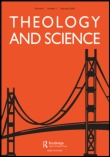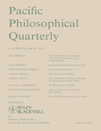
Prometeica-Revista de Filosofia y Ciencias
Scope & Guideline
Bridging Philosophy and Science for a Deeper Understanding
Introduction
Aims and Scopes
- Interdisciplinary Research:
The journal fosters interdisciplinary approaches, integrating insights from philosophy, psychology, sociology, and education to address complex societal issues. - Critical Examination of Social Issues:
Prometeica emphasizes the importance of critically examining social phenomena, such as mental health, education, and social justice, through philosophical inquiry. - Exploration of Cultural Narratives:
The journal engages with cultural texts and narratives, particularly through the works of influential thinkers like Borges, to understand their implications in contemporary contexts. - Philosophy and Technology:
There is a consistent focus on the relationship between philosophy and technology, especially concerning artificial intelligence and its ethical implications. - Mental Health and Well-Being:
The journal addresses mental health issues, exploring the interplay between psychological well-being, societal conditions, and philosophical perspectives.
Trending and Emerging
- Mental Health and Social Justice:
There is a growing emphasis on the intersection of mental health and social justice, reflecting a societal need to understand and address mental health issues within the context of equity and access. - Impact of Technology on Society:
The exploration of technology, particularly artificial intelligence and its ethical implications, has become a prominent theme as society grapples with rapid technological advancements. - Philosophy of Education:
An increasing focus on the philosophy of education, particularly concerning critical pedagogy and the role of education in social transformation, is evident in recent publications. - Environmental Ethics and Sustainability:
Emerging discussions on environmental ethics, sustainability, and the socio-political implications of ecological crises are gaining traction, aligning with global concerns about climate change. - Cultural and Narrative Studies:
The journal is increasingly engaging with cultural narratives and their philosophical implications, particularly through literary analysis and the works of influential authors like Borges.
Declining or Waning
- Traditional Philosophical Theories:
There seems to be a waning interest in classical philosophical theories that do not engage with contemporary issues or the socio-political context, as the journal increasingly prioritizes applied philosophy. - Historical Analysis of Philosophy:
Research that primarily focuses on historical philosophical analysis without connecting to current events or societal challenges is appearing less frequently. - Abstract Metaphysical Discussions:
Papers that delve into abstract metaphysical discussions, detached from practical applications or contemporary relevance, have seen a decline in favor of more pragmatic and accessible philosophical explorations.
Similar Journals

HISTORY AND PHILOSOPHY OF THE LIFE SCIENCES
Exploring the Nexus of History and Philosophy in Life SciencesHISTORY AND PHILOSOPHY OF THE LIFE SCIENCES, published by SPRINGER INT PUBL AG, stands as a leading peer-reviewed journal dedicated to exploring the intricate relationships between historical narratives and philosophical frameworks in the life sciences. With its robust impact factor and recognized position as a Q1 journal in key categories such as Arts and Humanities, History, and History and Philosophy of Science, this journal provides a vital platform for researchers, professionals, and students seeking to delve into the theoretical underpinnings and historical trajectories shaping contemporary life sciences. Established in 1979 and evolving through its converged years until 2024, it reflects the journal's enduring commitment to advancing scholarly discourse in its field. While the journal is not open access, it nonetheless attracts a diverse readership, facilitating meaningful research exchanges and interdisciplinary dialogues. Located in the picturesque country of Switzerland, the journal invites contributions that foster critical examination and innovative thinking in the historiography and philosophy of life sciences, ultimately enhancing our understanding of this dynamic and significant discipline.

Theology and Science
Exploring the Convergence of Belief and KnowledgeTheology and Science is a leading journal that explores the intricate relationships between theological discourse and scientific inquiry, contributing to the growing dialogue in the fields of Religious Studies, History, and Philosophy of Science. Published by the reputable ROUTLEDGE JOURNALS, TAYLOR & FRANCIS LTD in the United Kingdom, this journal provides a platform for high-quality research, fostering multidisciplinary approaches and addressing the philosophical implications of scientific developments from a theological perspective. With an impressive 2023 impact factor placing it in the Q1 category for Religious Studies and Q2 for both History and Philosophy of Science and Multidisciplinary studies, Theology and Science is positioned to influence academic discourse and shape contemporary understanding. Researchers, professionals, and students alike will find valuable insights and thought-provoking articles that not only advance scholarship but also bridge gaps between these two vital fields of human understanding.

Kalagatos-Revista de Filosofia
Empowering Research and Reflection in the Philosophical RealmKalagatos-Revista de Filosofia is a distinguished academic journal published by UNIV ESTADUAL CEARA-UECE, focusing on a broad spectrum of philosophical inquiries and scholarly discussions. With an ISSN of 1808-107X and an E-ISSN of 1984-9206, this Open Access journal has been dedicated to disseminating high-quality research and fostering critical thought in the field of philosophy since its inception in 2004. Positioned as a vital resource for researchers, professionals, and students alike, Kalagatos encourages dialogues that traverse traditional boundaries in philosophical discourse. With its commitment to accessibility and quality, the journal plays a pivotal role in contributing to the philosophical landscape, making knowledge available to a global audience. The journal seeks to publish original research articles, reviews, and essays that address contemporary and historical philosophical challenges, nurturing a vibrant academic community engaged in meaningful exploration and reflection.

Topicos-Revista de Filosofia
Cultivating a Vibrant Community of Philosophical ThinkersTopicos-Revista de Filosofia, published by UNIV PANAMERICANA, DEPT FILOSOFIA, stands as a significant academic platform within the field of philosophy, actively contributing to scholarly discourse since 2006 through its open access model. With an ISSN of 0188-6649 and an E-ISSN of 2007-8498, this journal is dedicated to fostering critical thought and philosophical inquiry in both regional and global contexts. Operating out of Mexico City, it provides a vital avenue for researchers, professionals, and students to engage with contemporary philosophical issues, reflected in its ranking of Q3 in the 2023 category for Philosophy and its position within the 33rd percentile among over 800 peer journals in the field according to Scopus. Topicos not only prioritizes accessibility to philosophical scholarship but also aims to propel academic discussions and elevate the standards of philosophical research. With coverage extending from 2013 to 2024, it invites contributions that bridge diverse philosophical traditions and innovative thought pathways, reinforcing its role as an influential resource for the philosophical community.

Claridades-Revista de Filosofia
Advancing Critical Engagement in Philosophical InquiryClaridades-Revista de Filosofia is a distinguished open-access journal dedicated to the exploration of philosophical thought and discourse, published by the ASOC PROMOCION FILOSOFIA & CULTURA MALAGA-FICUM. Since its inception in 2009, the journal has been committed to providing a platform for innovative philosophical research and insights, fostering engagement within the academic community and beyond. Based in the culturally rich city of Malaga, Spain, the journal caters to the diverse landscape of philosophical inquiry, with a focus on nurturing academic exchange globally. Although the journal currently holds a Q4 ranking in Philosophy according to Scopus, it aims to elevate its impact and contribute significantly to contemporary philosophical debates. Researchers, professionals, and students alike will find a wealth of thought-provoking articles and discussions that not only enrich their understanding of the discipline but also encourage critical dialogue about the pressing philosophical issues of our time. With its dedicated mission and open access model, Claridades is poised to be an essential resource for anyone invested in the vibrant and evolving field of philosophy.

Open Insight
Exploring the Depths of ThoughtOpen Insight is a prominent academic journal dedicated to the field of philosophy, published by the esteemed CENTRO INVESTIGACION SOCIAL AVANZADA, DIV FILOSOFIA in Mexico. Since its inception in 2017, Open Insight has been a vital platform for the dissemination of innovative philosophical discourse, bridging the gap between theoretical exploration and practical application in contemporary thought. With an ISSN of 2007-2406 and an E-ISSN of 2395-8936, this journal embraces a rigorous peer-review process and is committed to open access principles, ensuring the widest possible reach and impact of published research. Although currently positioned in the Q4 category and ranked 615 out of 806 in the Scopus Arts and Humanities (Philosophy) category, the journal actively encourages submissions that challenge conventional boundaries and inspire new avenues of inquiry. Researchers, educators, and students are invited to contribute their work, investigate philosophical dilemmas, and engage in meaningful discussions that resonate within the academic community and beyond.

Synesis
Elevating Brazilian Scholarship to the World StageSynesis is a distinguished academic journal published by UNIV CATOLICA PETROPOLIS, renowned for its commitment to advancing knowledge across a broad spectrum of disciplines, predominantly in the fields of social sciences and humanities. Operating under the ISSN 1678-6785 and E-ISSN 1984-6754, this journal provides a critical platform for researchers, professionals, and students to share original research articles, reviews, and scholarly discussions that contribute to the ongoing dialogue in these areas. Although it operates under a traditional access model, Synesis endeavors to maintain high quality and rigor in the peer-review process, ensuring that published works meet the highest academic standards. With its solid foundation laid in the intellectual hubs of Brazil, Synesis plays a vital role in fostering international collaborations and enhancing the visibility of Brazilian research on the global stage. Researchers seeking to disseminate their findings in a respected forum will find Synesis an invaluable outlet for their work.

PACIFIC PHILOSOPHICAL QUARTERLY
Exploring the Depths of Contemporary ThoughtWelcome to the PACIFIC PHILOSOPHICAL QUARTERLY, a leading journal in the field of philosophy, published by Wiley. With an impressive impact factor and ranked in the top 15% of its category (Q1 in Philosophy), this esteemed journal has become a vital source for scholars and practitioners alike. Established in 1996, the journal presents groundbreaking articles that explore contemporary philosophical issues, ensuring its relevance through converged contributions up to 2024. With robust Scopus rankings, including a position of #122 out of 806 in the Arts and Humanities category, the quarterly serves as a platform for innovative ideas and rigorous debates in the philosophical community. Though it does not offer open access, its insights are invaluable for researchers, professionals, and students eager to deepen their understanding of philosophical discourse.

Filosofskii Zhurnal
Challenging Perspectives in Philosophy and CultureFilosofskii Zhurnal, published by the esteemed Russian Academy of Sciences - Institute of Philosophy, is a renowned academic journal focused on the vibrant fields of Philosophy, Cultural Studies, History and Philosophy of Science, and Linguistics. With an ISSN of 2072-0726 and an E-ISSN of 2658-4883, this esteemed publication has been a pivotal source of scholarly discourse since its inception in 2019, with converged years extending through 2024. Holding a distinguished Q2 quartile ranking in several disciplines, the journal is instrumental in advancing knowledge and research within its realms, making significant contributions to the understanding of philosophical thought, cultural dynamics, and language interpretation. Although it does not currently offer open access options, the journal maintains a strong presence in Scopus with notable rankings, including its position at #490/806 in Philosophy and #837/1304 in Cultural Studies. By providing a platform for original research, critical reviews, and interdisciplinary dialogue, Filosofskii Zhurnal serves as a valuable resource for researchers, professionals, and students seeking to deepen their understanding of philosophical inquiry and related fields.

PHILOSOPHY OF SCIENCE
Unraveling the Threads of Scientific UnderstandingPHILOSOPHY OF SCIENCE, published by Cambridge University Press, serves as a premier journal at the intersection of history, philosophy, and science, making significant contributions to our understanding of scientific inquiry and its historical contexts. With an impressive impact factor reflected in its 2023 Category Quartiles—ranking Q1 in History, Q1 in History and Philosophy of Science, and Q1 in Philosophy—this journal stands out as a vital resource for researchers, professionals, and students alike. Operating without Open Access, it encourages the dissemination of groundbreaking ideas from 1949 through 2024, illustrated by its robust Scopus rankings, including a remarkable 98th percentile in the History category. Based in the United Kingdom at the prestigious Cambridge campus, PHILOSOPHY OF SCIENCE is committed to fostering scholarly dialogue and advancing critical thought in the philosophy of science.